The Singapore's Flag Performance (FSC) in 2017
In 2017, Singapore ships have performed well under Port State Control (PSC) in both the Tokyo and Paris MoU regimes:- Tokyo MoU regime - the detention ratio of Singapore ships is 0.78% against the regime's average of 3.01%.
- Paris MoU regime - the detention ratio of Singapore ships is 0.90% against the regime's average of 3.82%.
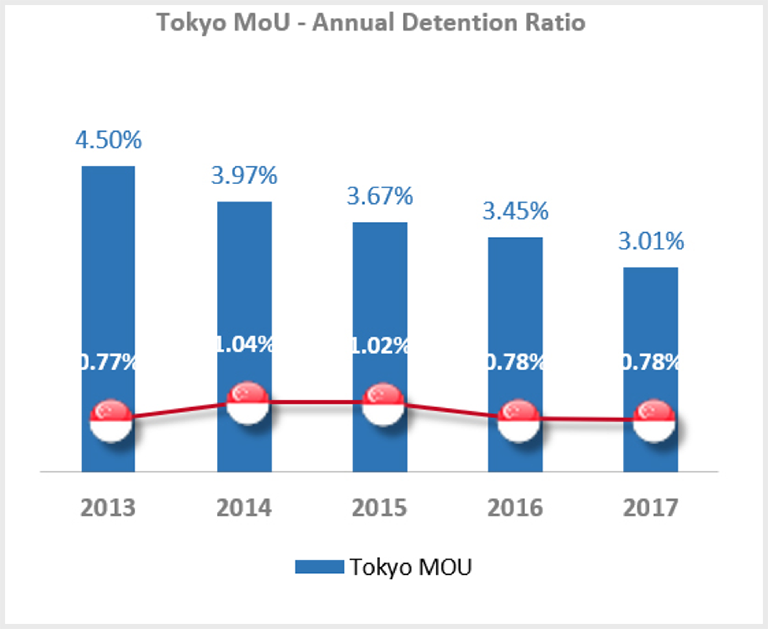
Figure 1
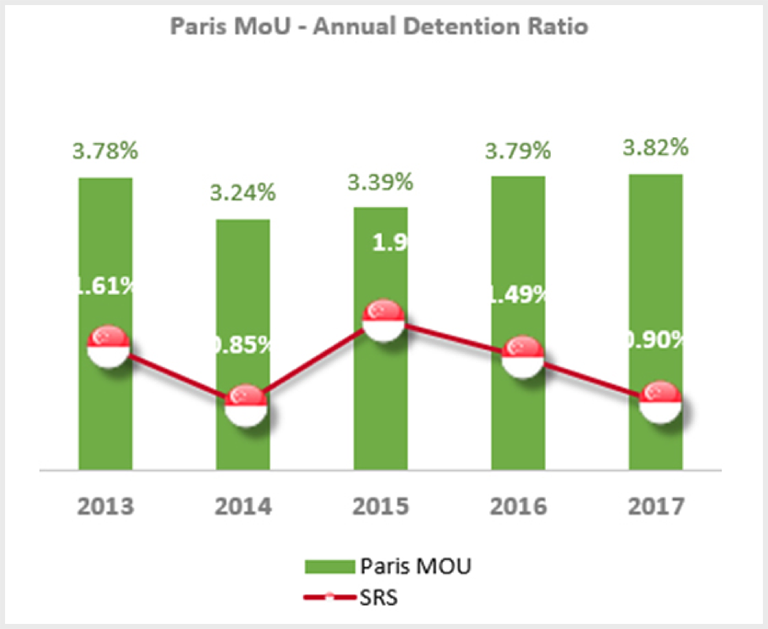
Figure 2
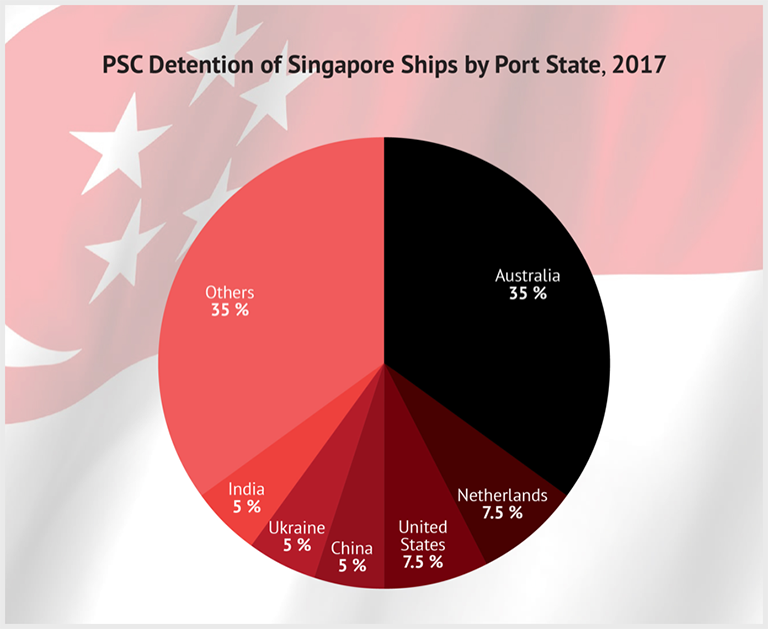 *Bahrain, Canada, Gabon, Indonesia, Iran, Italy, New
Zealand, Nigeria, Russia, South Africa, Spain, Tunisia,
Turkey, UAE.
*Bahrain, Canada, Gabon, Indonesia, Iran, Italy, New
Zealand, Nigeria, Russia, South Africa, Spain, Tunisia,
Turkey, UAE.
Figure 3
Most Common Causes of Ship Detentions
From the analysis of detention statistics for 2017, the four most common categories of PSC
detention deficiencies are fire safety, pollution prevention, certificate & documentation, and
lifesaving appliances. These categories make up almost half of the total detention deficiencies.
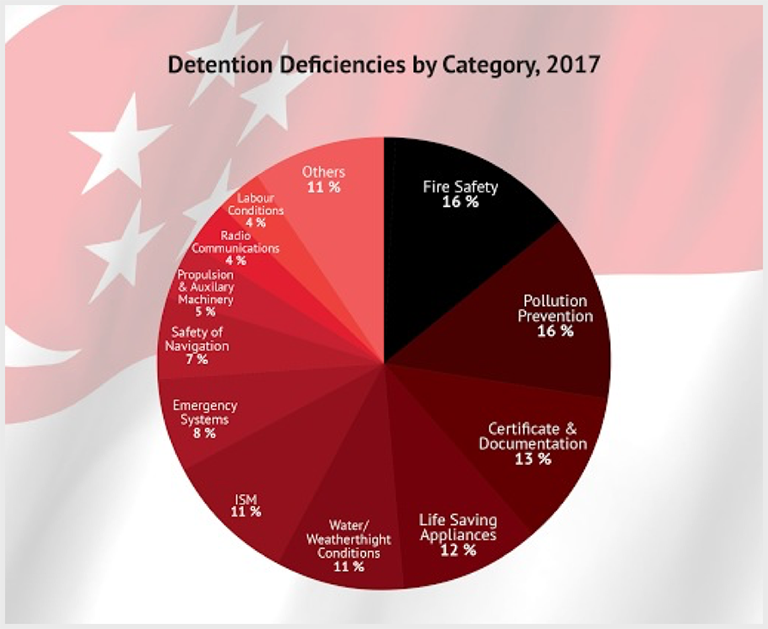 The PSC detention deficiencies under these four categories are summarised as follows:
The PSC detention deficiencies under these four categories are summarised as follows:

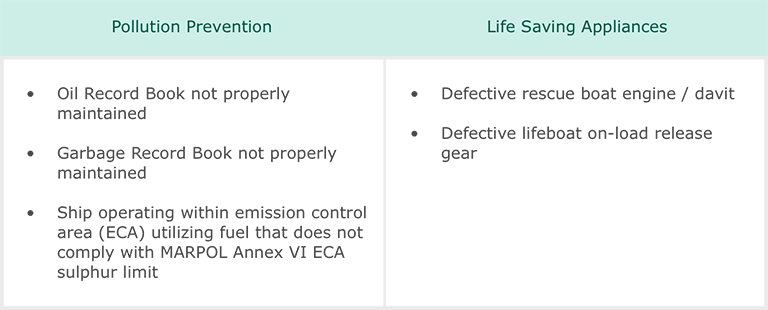 To safeguard Singapore's Quality Flag status, ship operators should ensure their Safety
Management Systems (SMS) are sufficiently robust and effectively implemented on board
their ships to prevent the common deficiencies as stated above.
Planned Maintenance Systems (PMS) implemented on board should include the proper
inspection, testing and maintenance of fire safety and lifesaving appliances, taking into
account the manufacturers' instructions. The crew in charge of these appliances should also
be provided with adequate work instructions and familiarised with the maintenance of these
appliances. In addition, senior officers on board should supervise the maintenance work
carried out by junior officers.
When filling up the Oil Record Book and Garbage Record Book, the crew in charge should
refer and familiarise themselves with the relevant IMO regulations and guidance (e.g. MEPC.
1/Circ.736). These records should be verified by the relevant senior officers.
Masters should also ensure that all their crew carry valid certificates and documents as
required by the various IMO Conventions.
For guidance related to ships operating in ECAs, you may refer to our SRS e-Bulletin article:
https://www.mpa.gov.sg/assets/srs/e-bulletins/Issue12/casestudy/Use-of-low-sulphurfuel.html.
We look forward to continual cooperation to eliminate these common deficiencies from our
ships so as to ensure that the Singapore Flag continues to perform well under the various port
State control regimes.
To safeguard Singapore's Quality Flag status, ship operators should ensure their Safety
Management Systems (SMS) are sufficiently robust and effectively implemented on board
their ships to prevent the common deficiencies as stated above.
Planned Maintenance Systems (PMS) implemented on board should include the proper
inspection, testing and maintenance of fire safety and lifesaving appliances, taking into
account the manufacturers' instructions. The crew in charge of these appliances should also
be provided with adequate work instructions and familiarised with the maintenance of these
appliances. In addition, senior officers on board should supervise the maintenance work
carried out by junior officers.
When filling up the Oil Record Book and Garbage Record Book, the crew in charge should
refer and familiarise themselves with the relevant IMO regulations and guidance (e.g. MEPC.
1/Circ.736). These records should be verified by the relevant senior officers.
Masters should also ensure that all their crew carry valid certificates and documents as
required by the various IMO Conventions.
For guidance related to ships operating in ECAs, you may refer to our SRS e-Bulletin article:
https://www.mpa.gov.sg/assets/srs/e-bulletins/Issue12/casestudy/Use-of-low-sulphurfuel.html.
We look forward to continual cooperation to eliminate these common deficiencies from our
ships so as to ensure that the Singapore Flag continues to perform well under the various port
State control regimes.


